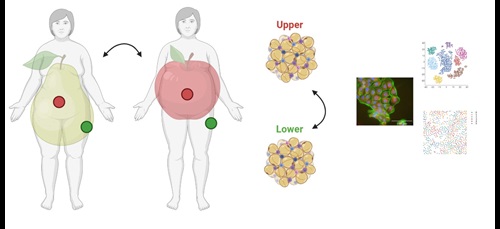While obesity is a major risk factor for development of type 2 diabetes and cardiovascular disease, some obese individuals are protected against these complications. The mechanisms underlying this so-called metabolically healthy obesity are not well understood, however, storage of excess energy in lower body fat depots on the hips (pear-shaped obesity) is favorable compared to storage in upper body fat depots of the abdominal region (apple-shaped obesity).
In the proposed project funded by Sygesikringen "danmark", Professor and Center Director Susanne Mandrup will together with Assistant Professor Søren Fisker Schmidt use advanced single cell sequencing techniques to map differences in cellular compositions and signaling states between fat biopsies from the abdominal and hip regions of people with apple- and pear-shaped obesity. Biopsies will be obtained through a collaboration with Fredrik Karpe, Professor at University of Oxford and Director of the Oxford Biobank. This is a recall-by-phenotype biobank with carefully clinically characterized individuals, which will allow for correlation of the identified cellular and molecular differences with both different biochemical indicators of metabolic health and with underlying genetic variance. In collaboration with Associate Professor Jonathan Brewer from Department of Biochemistry and Molecular Biology, SDU, they will apply bioimaging approaches to map the relative spatial locations of the identified cellular populations and to investigate paracrine signaling between these.

Figure 1 - Body fat tends to be stored in depots on either the hips (pear-shaped) or the abdominal region (apple-shaped). In the present project, biopsies will be obtained from hip and stomach regions of people of either shape, and compared using advanced single cell sequencing techniques and sophisticated bioimaging approaches. Illustration created with BioRender.com
Overall, the project will provide fundamental new insight to the understanding of human adipose tissue biology, which will have major impact on future basic and biomedical research in the field. In this regard, the project synergizes very well with Center for Functional Genomics and Tissue Plasticity (ATLAS) funded by the Danish National Research Foundation and directed by Susanne Mandrup. Most importantly, integration of single cell data derived from the longitudinal study in ATLAS with the cross-sectional study planned in this project will improve identification of key transcriptional and signaling mediators causally associated with healthy (and unhealthy) adipose tissue that can be explored therapeutically with the aim to prevent development of obesity comorbidities.